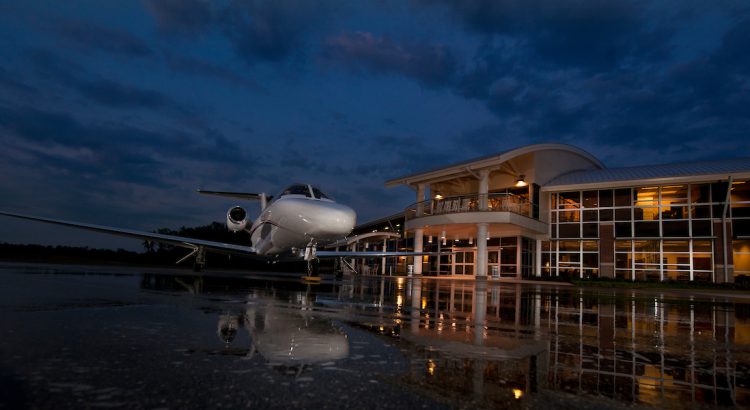By Neal Reid
The COVID-19 pandemic has shuttered businesses, curbed progress in countless areas and stunted growth across the globe, but Auburn University’s Department of Aviation has weathered the storm and is flying high as another semester comes to a close on the Plains.
With a record number of approximately 160 students joining the storied program this fall, the flourishing department kept its talented team of instructors and team leaders busy accommodating an increase in interest while adjusting to “new norms” forced by the pandemic. The Department of Aviation boasts roughly 400 students who are professional flight majors and another 200-plus aviation management majors, giving Auburn a robust presence in the aviation world and an optimistic outlook toward a promising future.
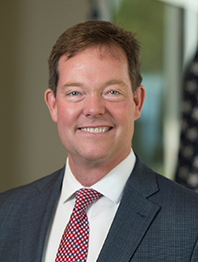
“The freshman class is bigger than the senior class,” said James Birdsong, aviation program coordinator and recent winner of the 2020 Alumni Undergraduate Teaching Excellence Award. “The net number of graduates each year is probably about 50 to 60 right now, but that number’s going to increase more and more.
“These men and women are young, and they’ve got 40 years ahead of them in the industry. They’re going to be really good.”
The pandemic forced the airline industry into a holding pattern over the summer, but that has begun to change this fall. Balanced by a significant number of the nation’s pilots “aging out” due to the mandatory retirement age of 65, others opting for early retirement and an increase in corporate air travel in the wake of the coronavirus, the need for pilots remains strong, according to Auburn’s experts.
“I think demand will be what it was pre-COVID for our graduates,” said Bill Hutto, past acting chair and Airport and Aviation Center director. “They’re going to be well-positioned to take advantage of the industry bounce back. The future is really bright.”
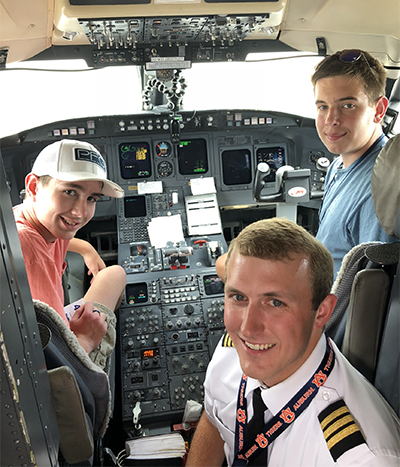
Based at Auburn University Regional Airport, the Auburn aviation program has produced more than 4,000 alumni the past 75 years and has deep roots that date back to 1939, when the university purchased the airport to train pilots for World War II. The department provides private and commercial pilot certification, instrument ratings, multi-engine ratings, certified flight instructor training, among other instruction.
Both degrees qualify for the Federal Aviation Administration, or FAA, Restricted Airline Transport Pilot certification, and the department’s headquarters also serve as a testing center for FAA exams. Its resources include 35 Cessna 172s and four Piper Seminoles, the department also has a simulator bay at its disposal and in 2018 partnered with Delta to open the Delta Air Lines Aviation Education Building.
This September, the program’s Striped Wings Student Aviation Ambassadors produced an in-depth tour video highlighting Auburn Aviation, and its “Planes on the Plains” historical video series debuted in early October.
Training more than pilots
Auburn’s aviation program, especially the aviation management major, is designed to teach students the business side of the industry. With a goal of giving students a comprehensive understanding of all aspects of aviation operations, it can lead to careers with airlines, airline manufacturers, airports and other segments of the industry.
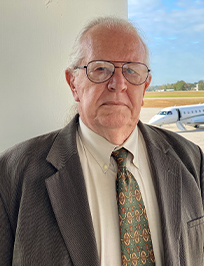
Auburn Department of Aviation Chair James Witte stresses the fact that Auburn’s diverse aviation program is not solely looking to churn out pilots.
“We don’t train pilots here, we train aviators,” said Witte a U.S. Army veteran who soloed his first aircraft in 1957, the same year Auburn’s football team won its first national title. “We’re training people here who go into the cockpit who are cognizant of the industry and are cognizant of the forces that make an industry successful.
“I think this is an important element that, to a large extent, sets us apart from other entities.”
By doing so, Witte says, Auburn will help produce well-rounded leaders who will be major contributors once the industry fully recovers as estimated in 2023 or 2024.
“We’re very confident in the future projections,” Witte said. “The complexion of the industry will change as a result, but I think by diversifying, we’re staying on the cutting edge of the industry.”
Expanding future collaboration
Auburn’s Department of Aviation, part of the College of Liberal Arts, has worked in tandem with a number of other departments and colleges across campus, and that tradition will only grow in the future.
“The strength of this department is the collaboration that it has with other departments and colleges, from kinesiology to psychology to education, hotel and restaurant management to human sciences,” Hutto said. “Because aviation touches so many aspects, I think that’s very positive.”
In addition, program leaders have been meeting with other industry leaders to forge relationships that will lead to new partnerships in the future.
“We’re very much looking forward to having an agreement with Southern Union State Community College to be involved with the training of aircraft mechanics,” Witte said. “We’re also looking seriously at the prospect of contributing to flight attendant’s training. It’s a joint effort with the hospitality, restaurant management folks. So, we’re looking at contributing to the entire industry.”
Witte said he and Birdsong have worked on a project with the FAA focused on air traffic control training to further broaden the program’s horizons. The industry itself is evolving and expanding into fields like drone piloting, and that growth venture could result in a larger presence in Auburn’s training programs.
“It’s really neat to sit down with people outside your own discipline and listen to how they look at things,” Witte said. “What we’re looking at here is a program that prepares the pilot for the FAA certification. Unmanned aircraft are used in agriculture, forestry, law enforcement, mapping and the real estate industry. We’re looking to take the program that we now have and expand it into more applications that are industry centered.”
Diverse, talented students, team leaders
Auburn’s aviation program is 16% female, which is three times the national average for the industry and a source of strength, according to its leaders.
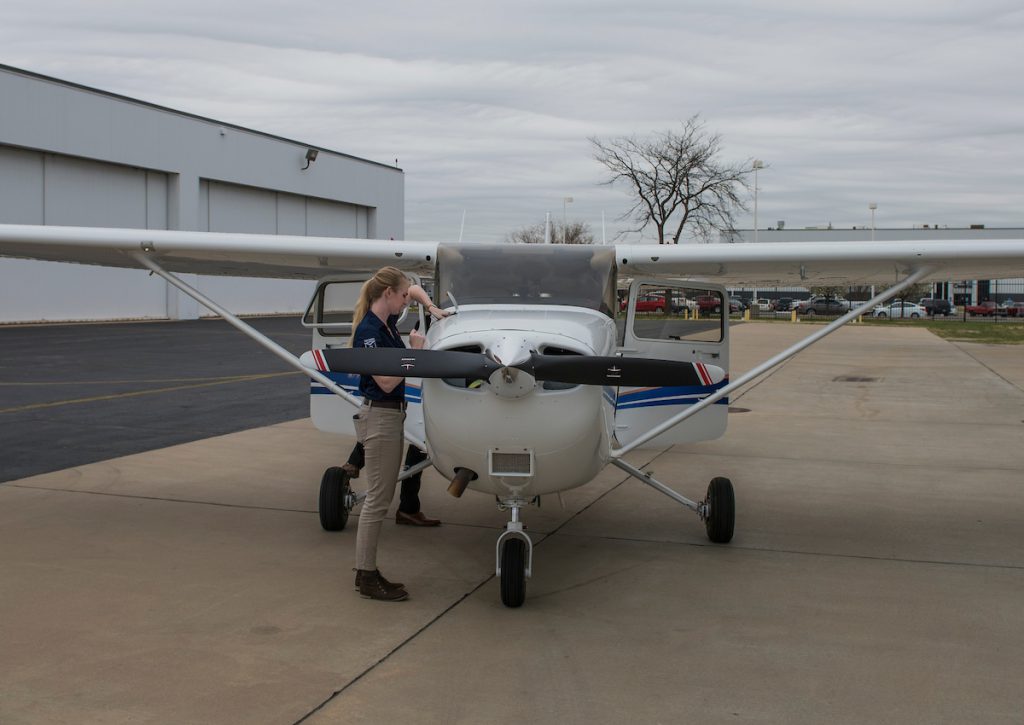
“We have a women’s flight team here, and when those young ladies pull into a traffic pattern to come in and land, everybody’s watching,” Witte said. “All of us here are extremely proud of the status of those young ladies, and they’re knocking it out of the park.”
Other standouts among the Auburn Aviation student body include football players Nick Brahms and Anders Carlson, both sons of pilots, and they recently were featured in this AL.com article.
Atlanta native Will Leveille—a 2017 professional flight graduate who works as a corporate pilot in the air transportation department at the Auburn airport—recently was named to the 2020 Business Aviation Top 40 Under 40 list by the National Business Aviation Association. The 26-year-old helped found the Striped Wings Student Aviation Ambassador organization at Auburn and has served as an ambassador with the Commemorative Air Force Red Tail Squadron.
Auburn’s experienced group of instructors and its management team go to work each day fueled by a love of the industry, a desire to mold and train the aviators of tomorrow and are inspired by the ever-changing nature of the business. They come from a variety of backgrounds and geographic areas, but are unified by a duty to provide students a holistic and inter-disciplinary approach to learning.
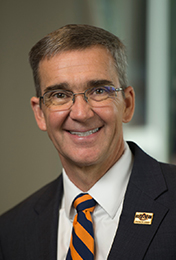
“We have people from corporate aviation, from military, from airlines, from airport backgrounds, you name it, that bring the different diversity to the table,” Hutto said. “We work with each other, and it’s really unique.”
Witte is the newest addition to the department’s leadership team, and he has thoroughly enjoyed his time thus far at Auburn.
“It’s a great place to be,” Witte said. “It’s a vibrant environment and just a really exciting time. I like to call it ‘entrepreneurial education.’ We’re not just sitting here waiting for students to come in. We’re carving programs that attract students to come in, and then we solicit for them in the marketplace when they graduate.”
One word comes to Hutto’s mind to describe the department’s labor of love—passion. “When you enjoy what you do and there’s a passion, that’s what drives this whole program,” Hutto said. “If you don’t have passion, you don’t belong on this staff. You’re not going to survive. You’re going to get run over.”
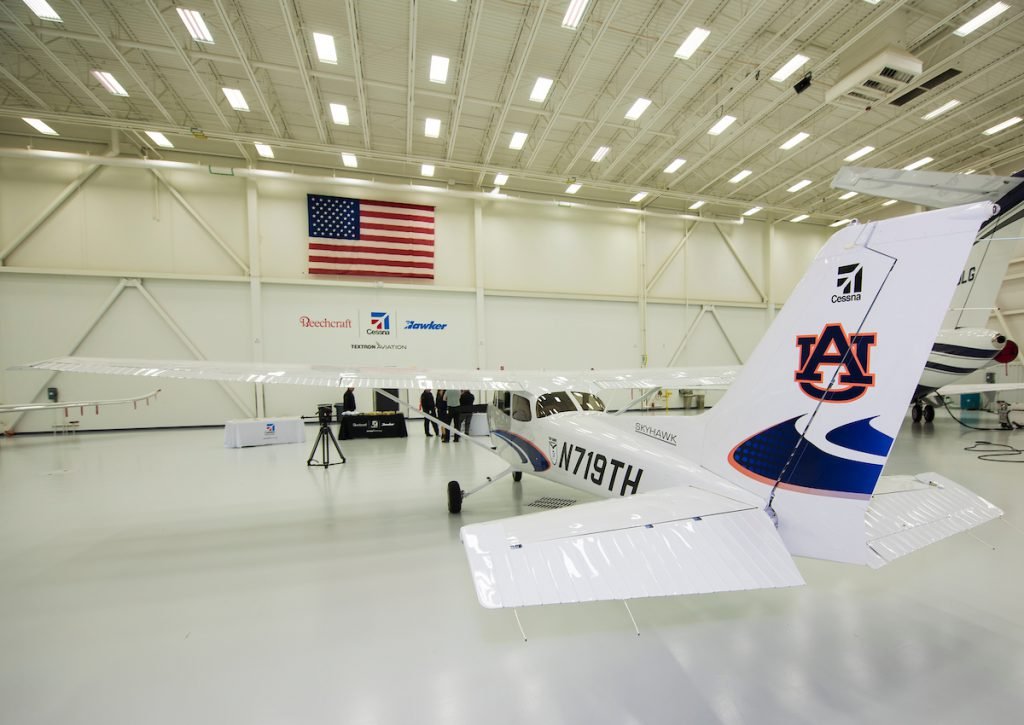
Hutto also applauded university and state administrators for their support through the years and said that united front has helped Auburn Aviation reach new heights, with even grander achievements on the horizon.
“We’ve had support from university leadership and support from the state of Alabama,” Hutto said. “It takes all of that, but one thing about this team is that we’re mission-focused, so we don’t get lost in the weeds. It’s, ‘This is what we need to do. What’s in the best interest of our students? What’s in the best interest of our university? Let’s get it done.’
“That’s been the mindset that has taken us forward. So, the future’s bright for all in aviation. It’s really exciting.”
